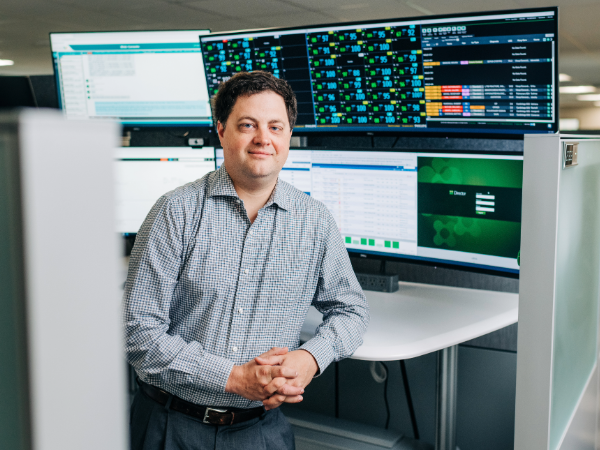 Established in response to a need to expand access to neurologic care throughout Alabama, the acute teleneurology service at UAB recently recognized a significant milestone as it marked 10,000 consults.
Established in response to a need to expand access to neurologic care throughout Alabama, the acute teleneurology service at UAB recently recognized a significant milestone as it marked 10,000 consults.
According to Michael Lyerly, M.D., physician lead of the UAB eMedicine Telestroke Program and associate professor in the UAB Department of Neurology, Alabama is under-resourced with neurologists in general and particularly in non-urban areas. More than a third of Alabama's neurologists are located at UAB, and based on an estimate from the American Academy of Neurology, there is a need for an additional 100 neurologists in the state—a need that is poised to increase as new treatments become available for chronic neurologic conditions.
“Our ultimate goal is to ensure that any patient with an acute neurologic condition receives timely access to potentially life-saving therapies at any hospital in the state,” Lyerly said.
UAB launched its teleneurology program in 2018 to help expand access to neurologic expertise across Alabama, with a specific focus on acute stroke care at hospitals affiliated with UAB. The program has expanded geographically since then thanks to partnerships with St. Vincent’s Hospitals and Mobile Infirmary. It has also expanded its scope of services, combining with UAB’s general neurology telemedicine program into one acute teleneurology service in 2024. Today, the teleneurology service serves 35 hospitals across the state—ranging from smaller rural medical centers to large urban hospitals, with UAB eMedicine as a whole available at 40 sites.
Since its inception, the program has experienced steady growth. It now provides approximately 400 acute consults each month, leading up to its recent milestone of 10,000 consults. According to Lyerly, this growth is a testament to the critical role of telemedicine.
“The consistently high month-to-month volume reflects the overall satisfaction from the providers and staff at our telestroke sites,” Lyerly said. “With many available telemedicine services in the market, our program has the edge of providing telehealth services from physicians based in Alabama who are knowledgeable about each hospital and the regional transfer networks within the state.”
In addition to connecting physicians with neurologists remotely, Lyerly and his team help each site optimize best practices and streamline processes related to neurologic patient care. For example, the telestroke arm of the program works closely with the Alabama Department of Public Health's statewide stroke system to help stroke centers ensure patients receive timely care that aligns with the statewide system’s requirements.
“We hope to have continued growth over the coming years but also want to ensure ongoing engagement with our existing network to ensure that they stay current on best practices in the ever-changing landscape of therapeutic options for neurologic patients,” Lyerly said.
Charlie Angel, Director of Operations for UAB eMedicine, recognized how the success of the acute teleneruology service has not only improved access to specialized care but also inspired similar models in other areas of medicine.
“We’ve made significant strides in extending our reach beyond our four walls to ensure patients receive high-quality neurological care, no matter where they are,” Angel said. “We’re now applying this successful framework to establish tele-trauma, further strengthening our ability to deliver timely, expert care when and where it’s needed most.”
Lyerly stressed that the acute teleneurology service is a comprehensive team approach, with Angel and Matt Murphree overseeing program operations; Brannon Vines, M.D., associate professor in the Department of Neurology, overseeing general neurology telemedicine and tele-EEG; Tonya Reid, BSN, R.N., serving as stroke coordinator; and Cammie Shoemaker, DNP, R.N., serving as quality improvement manager for the UAB Comprehensive Stroke Center.